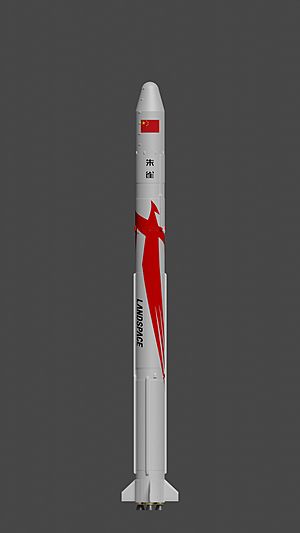Zhuque-2 facts for kids
The Zhuque-2 (also called ZQ-2) is a Chinese rocket built by a company called LandSpace. It's a medium-sized rocket designed to send things into orbit around Earth.
This rocket is special because it uses a fuel mix called "methalox." This means it runs on liquid oxygen and liquid methane. The Zhuque-2 was the first rocket using this type of fuel to successfully reach orbit! It was part of a race with other rockets like Relativity Space's Terran 1 and SpaceX's Starship to achieve this.

Rendering of Zhuque-2
|
|
| Function | Orbital launch vehicle |
|---|---|
| Manufacturer | LandSpace |
| Country of origin | China |
| Size | |
| Height | 49.5 m (162 ft) |
| Diameter | 3.35 m (11.0 ft) |
| Mass | 219,000 kg (483,000 lb) |
| Stages | 2 |
| Capacity | |
| Payload to Low Earth orbit (LEO) | 6,000 kg (13,000 lb) |
| Payload to Sun-synchronous orbit (SSO) | 4,000 kg (8,800 lb) |
| Launch history | |
| Status |
|
| Launch sites |
|
| Total launches |
|
| Successes |
|
| Failures | 1 |
| First flight |
|
| Last flight | 8 December 2023 |
| First stage | |
| Engines |
|
| Thrust | 2,680 kN (273 tf; 600,000 lbf) |
| Fuel | LOX / CH4 |
| Second stage | |
| Engines |
1 x TQ-11 (Vernier)
|
| Thrust |
|
| Fuel | LOX / CH4 |
Contents
How the Zhuque-2 Rocket Works
The Zhuque-2 rocket weighs about 216,000 kilograms when it lifts off. It has two main parts, called stages.
First Stage Engines
The first stage of the rocket has four powerful TQ-12 engines. Each of these engines produces a lot of push, about 67,000 kilograms of force. These engines use the special methalox fuel.
Second Stage Engines
The second stage has one TQ-12 engine that is made to work best in the vacuum of space. It also has a smaller TQ-11 engine. This smaller engine is called a vernier thruster. It helps steer the rocket very precisely.
What Can Zhuque-2 Carry?
The Zhuque-2 is strong enough to lift heavy things into space. It can carry about 6,000 kilograms (which is like the weight of an elephant!) into a low Earth orbit. This is an orbit closer to Earth, about 200 kilometers up.
It can also carry 4,000 kilograms into a Sun-synchronous orbit. This type of orbit is higher, around 500 kilometers up. Satellites in this orbit always pass over the same part of Earth at the same time of day.
History of Zhuque-2
LandSpace, the company that built Zhuque-2, started testing its engines a few years ago.
Engine Testing
In May 2019, LandSpace tested the TQ-12 rocket engine. This happened at their test site in Huzhou, China. The engine worked well, showing it could produce a lot of power.
The company planned to make many ZQ-2 rockets and TQ-12 engines each year. This would help them launch more missions into space.
First Flight Attempt
On December 14, 2022, the Zhuque-2 rocket had its first launch. It was the first time a methane-fueled rocket tried to reach orbit.
However, the rocket did not make it to orbit. The engines on its second stage stopped too early. Even though it didn't reach orbit, it did fly high enough to enter space.
Successful Second Flight
After fixing the problem, LandSpace got ready for another launch. In March 2023, they finished building the second Zhuque-2 rocket.
On July 12, 2023, the Zhuque-2 made history! It successfully reached orbit on its second flight. This made it the first methane-fueled rocket ever to get into orbit.
Zhuque-2 Launches
Here is a list of the Zhuque-2 rocket's flights:
| Rocket & Serial | Flight No. | Date (UTC) | Payload | Orbit | Launch Site | Outcome | Notes |
|---|---|---|---|---|---|---|---|
| Zhuque-2 | Y1 | 14 December 2022 08:30 |
Various | SSO | Jiuquan, Site 96 | Failure | The small steering engines on the second stage failed. This was the first time a rocket using liquid methane fuel reached space (over 100 kilometers high). |
| Zhuque-2 | Y2 | 12 July 2023 01:00 |
No payload (Flight test) | SSO | Jiuquan, Site 96 | Success | This was the first time a rocket using liquid methane fuel successfully reached orbit. |
| Zhuque-2 | Y3 | 8 December 2023 23:39 |
Honghu-1 Honghu-2 Tianyi 33 |
SSO | Jiuquan, Site 96 | Success | This was the first methane rocket to successfully launch real satellites into orbit. |
See also
- Comparison of orbital launcher families
- Comparison of orbital launch systems
- Expendable launch system
- Lists of rockets
 | Valerie Thomas |
 | Frederick McKinley Jones |
 | George Edward Alcorn Jr. |
 | Thomas Mensah |

